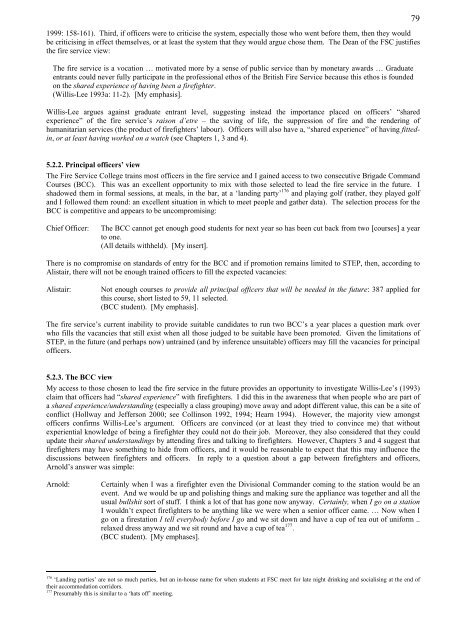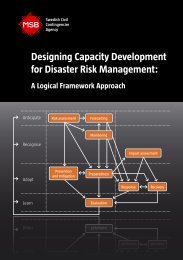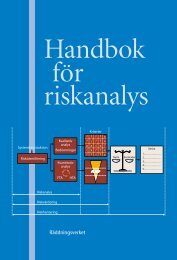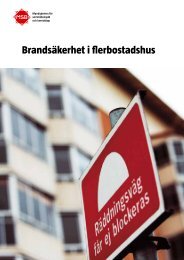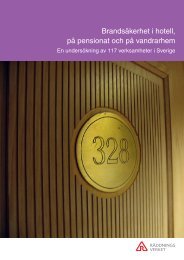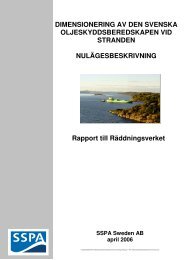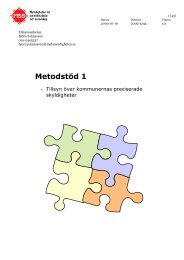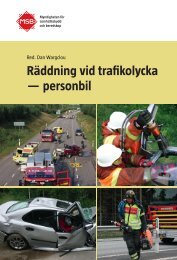One more last working class hero
One more last working class hero
One more last working class hero
Create successful ePaper yourself
Turn your PDF publications into a flip-book with our unique Google optimized e-Paper software.
1999: 158-161). Third, if officers were to criticise the system, especially those who went before them, then they would<br />
be criticising in effect themselves, or at least the system that they would argue chose them. The Dean of the FSC justifies<br />
the fire service view:<br />
The fire service is a vocation … motivated <strong>more</strong> by a sense of public service than by monetary awards … Graduate<br />
entrants could never fully participate in the professional ethos of the British Fire Service because this ethos is founded<br />
on the shared experience of having been a firefighter.<br />
(Willis-Lee 1993a: 11-2). [My emphasis].<br />
Willis-Lee argues against graduate entrant level, suggesting instead the importance placed on officers’ “shared<br />
experience” of the fire service’s raison d’etre – the saving of life, the suppression of fire and the rendering of<br />
humanitarian services (the product of firefighters’ labour). Officers will also have a, “shared experience” of having fittedin,<br />
or at least having worked on a watch (see Chapters 1, 3 and 4).<br />
79<br />
5.2.2. Principal officers’ view<br />
The Fire Service College trains most officers in the fire service and I gained access to two consecutive Brigade Command<br />
Courses (BCC). This was an excellent opportunity to mix with those selected to lead the fire service in the future. I<br />
shadowed them in formal sessions, at meals, in the bar, at a ‘landing party’ 176 and playing golf (rather, they played golf<br />
and I followed them round: an excellent situation in which to meet people and gather data). The selection process for the<br />
BCC is competitive and appears to be uncompromising:<br />
Chief Officer:<br />
The BCC cannot get enough good students for next year so has been cut back from two [courses] a year<br />
to one.<br />
(All details withheld). [My insert].<br />
There is no compromise on standards of entry for the BCC and if promotion remains limited to STEP, then, according to<br />
Alistair, there will not be enough trained officers to fill the expected vacancies:<br />
Alistair:<br />
Not enough courses to provide all principal officers that will be needed in the future: 387 applied for<br />
this course, short listed to 59, 11 selected.<br />
(BCC student). [My emphasis].<br />
The fire service’s current inability to provide suitable candidates to run two BCC’s a year places a question mark over<br />
who fills the vacancies that still exist when all those judged to be suitable have been promoted. Given the limitations of<br />
STEP, in the future (and perhaps now) untrained (and by inference unsuitable) officers may fill the vacancies for principal<br />
officers.<br />
5.2.3. The BCC view<br />
My access to those chosen to lead the fire service in the future provides an opportunity to investigate Willis-Lee’s (1993)<br />
claim that officers had “shared experience” with firefighters. I did this in the awareness that when people who are part of<br />
a shared experience/understanding (especially a <strong>class</strong> grouping) move away and adopt different value, this can be a site of<br />
conflict (Hollway and Jefferson 2000; see Collinson 1992, 1994; Hearn 1994). However, the majority view amongst<br />
officers confirms Willis-Lee’s argument. Officers are convinced (or at least they tried to convince me) that without<br />
experiential knowledge of being a firefighter they could not do their job. Moreover, they also considered that they could<br />
update their shared understandings by attending fires and talking to firefighters. However, Chapters 3 and 4 suggest that<br />
firefighters may have something to hide from officers, and it would be reasonable to expect that this may influence the<br />
discussions between firefighters and officers. In reply to a question about a gap between firefighters and officers,<br />
Arnold’s answer was simple:<br />
Arnold:<br />
Certainly when I was a firefighter even the Divisional Commander coming to the station would be an<br />
event. And we would be up and polishing things and making sure the appliance was together and all the<br />
usual bullshit sort of stuff. I think a lot of that has gone now anyway. Certainly, when I go on a station<br />
I wouldn’t expect firefighters to be anything like we were when a senior officer came. … Now when I<br />
go on a firestation I tell everybody before I go and we sit down and have a cup of tea out of uniform ..<br />
relaxed dress anyway and we sit round and have a cup of tea 177 .<br />
(BCC student). [My emphases].<br />
176 ‘Landing parties’ are not so much parties, but an in-house name for when students at FSC meet for late night drinking and socialising at the end of<br />
their accommodation corridors.<br />
177 Presumably this is similar to a ‘hats off’ meeting.


